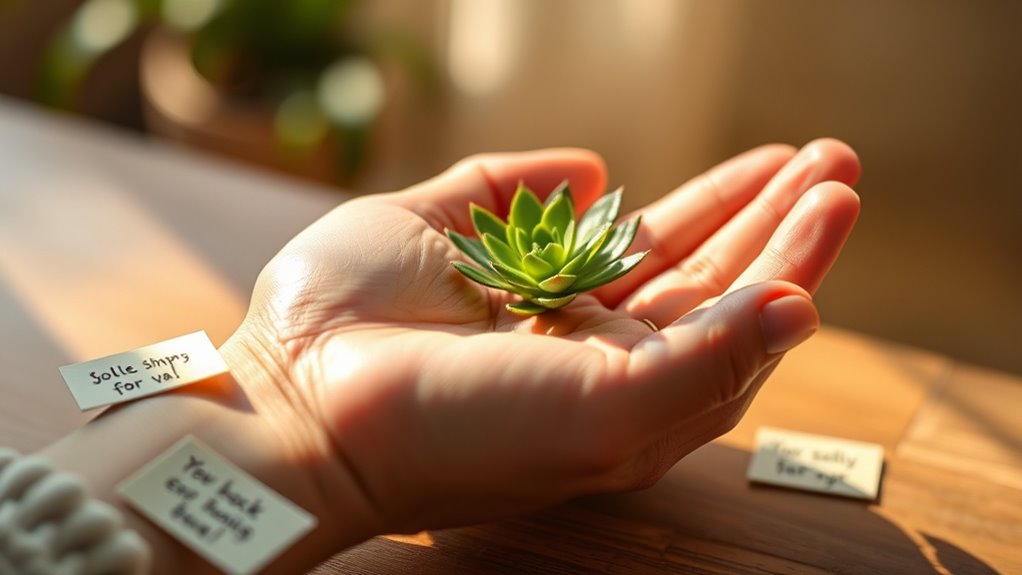To build self-love through tiny habits, start small: practice kind self-talk daily, acknowledge your efforts, or share gratitude. Use cues like visual reminders or supportive environments to reinforce these actions. Seek encouragement from loved ones and celebrate your progress, no matter how small. Consistency matters, so keep the routines simple and approachable. If you stay committed, you’ll discover more effective ways to nurture self-compassion that can truly transform how you treat yourself.
Key Takeaways
- Start with tiny, manageable self-kindness actions like deep breathing or gentle self-talk to integrate self-compassion into daily routines.
- Use environmental cues, such as reminders or affirmations, to prompt consistent self-love practices effortlessly.
- Reinforce habits through social support, sharing progress with trusted peers or loved ones for accountability and encouragement.
- Track small acts of self-care and celebrate progress to build confidence and sustain motivation over time.
- Break larger self-compassion goals into tiny steps, making behavior change sustainable and reducing overwhelm.
Understanding Self-Compassion and Its Benefits

Self-compassion involves treating yourself with kindness, understanding, and patience, especially during times of failure or struggle. When you practice self-compassion, you acknowledge your imperfections without harsh judgment, fostering a supportive mindset. This approach helps reduce stress and boosts your mental resilience. Unlike self-esteem, which depends on success or social approval, self-compassion provides a stable sense of worth rooted in kindness toward yourself. It encourages you to accept mistakes as part of growth, promoting healthier motivation and better emotional regulation. Over time, cultivating self-compassion improves your mental health, helps you build stronger social connections, and supports healthier behaviors. Incorporating well-being techniques into your daily routine can further enhance your self-compassion practices and overall resilience. Small, consistent actions can make a meaningful difference in how you relate to yourself and handle life’s challenges.
The Science Behind Tiny Habits and Behavior Change

You can create lasting change by focusing on small, manageable steps that fit into your daily routine. Your environment and social cues play a pivotal role in shaping your habits and motivation. By intentionally adjusting these factors, you set the stage for meaningful behavior change over time. Incorporating tiny habits such as self-compassion exercises can reinforce positive self-image and promote emotional well-being.
Small Steps, Big Change
Small steps have a powerful impact on behavior change because they capitalize on the brain’s natural tendency to adapt gradually. When you break down self-compassion practices into tiny, manageable actions, you reduce overwhelm and increase consistency. These small actions, like pausing to acknowledge a mistake with kindness or sharing a gratitude thought, reinforce new neural pathways without demanding major effort. The brain responds positively to achievable goals, creating a sense of progress and mastery. Over time, these tiny habits compound, leading to lasting shifts in self-perception and behavior. Additionally, incorporating easy-to-maintain routines helps embed self-compassion into daily life seamlessly. By focusing on small, daily actions, you build confidence and resilience, making self-compassion an integral part of your routine. Small steps, repeated consistently, truly lead to big change.
Environment Shapes Habits
Your environment plays a powerful role in shaping habits, influencing your behavior often without you realizing it. Small changes in your surroundings or social cues can trigger positive actions and reinforce self-compassion practices. For example, placing a gratitude journal on your bedside table makes it easier to reflect on what you’re grateful for each morning. Social feedback, like encouragement from friends or family, can boost your confidence and motivation to practice self-kindness. Conversely, clutter or negative cues can hinder your progress. By intentionally shaping your environment—such as creating spaces that promote mindfulness or self-care—you set the stage for tiny habits to flourish. These subtle shifts make it easier to integrate self-compassion into daily life, turning small actions into lasting change.
Simple Daily Actions to Cultivate Self-Kindness

Starting your day with a simple self-compassion routine can set a positive tone and reinforce kindness toward yourself. Practicing mindful self-talk helps you catch negative thoughts and replace them with encouraging messages. Taking a moment for gentle self-reflection allows you to acknowledge your feelings without judgment and nurture self-kindness throughout the day. Incorporating self-awareness techniques, such as recognizing your emotional responses, can further deepen your understanding and compassion for yourself.
Morning Self-Compassion Routine
Implementing a morning self-compassion routine can set a positive tone for the day by fostering kindness toward yourself from the moment you wake up. Start by taking a few deep breaths and intentionally offering yourself words of encouragement, like “Today, I choose to be kind to myself.” You might also place a reminder or affirmation somewhere visible, such as a sticky note or phone notification, to prompt self-compassionate thoughts. Incorporate gentle physical gestures, like placing your hand over your heart, to reinforce your self-kindness. Practicing mindfulness techniques, such as focused breathing or gentle stretches, can further enhance your sense of mental well-being. Consistently practicing these small actions helps rewire your mindset, making self-compassion feel natural during daily challenges. A simple morning ritual anchors your focus on self-love, boosting resilience and emotional well-being throughout the day.
Mindful Self-Talk Practices
Building on the foundation of a morning self-compassion routine, cultivating mindful self-talk can deepen your sense of kindness and resilience throughout the day. By paying attention to your internal dialogue, you can replace critical or negative thoughts with supportive, gentle words. This practice encourages a caring attitude toward yourself, especially during setbacks or stressful moments. To enhance this, try these simple actions:
- Pause and notice when negative thoughts arise, then intentionally reframe them with compassionate language.
- Use affirmations like “I am doing my best” or “It’s okay to feel this way.”
- When facing mistakes, remind yourself, “Everyone makes errors; I can learn and grow from this.”
Consistently practicing these steps fosters a more compassionate inner voice, strengthening your self-love over time.
Gentle Self-Reflection Moments
Everyday moments offer simple opportunities to nurture self-kindness through gentle self-reflection. Take a few seconds during routine activities—like brushing your teeth or waiting in line—to check in with yourself. Ask a gentle question, such as “How am I feeling right now?” or “What do I need today?” Avoid judgment and focus on understanding your emotions without criticism. This practice helps you recognize your experiences with compassion, reducing self-criticism and fostering acceptance. Incorporate a brief gratitude or affirming thought, like “I’m doing my best” or “I deserve kindness.” Over time, these small moments build a habit of self-awareness and kindness, creating a foundation of self-compassion that supports your overall wellbeing and resilience.
Creating Environment Cues to Reinforce Self-Compassion

Creating environment cues that reinforce self-compassion involves strategically arranging your surroundings to remind and encourage kind, supportive behaviors toward yourself. These cues serve as gentle prompts that nudge you toward self-love throughout the day. For example, placing sticky notes with affirmations on your mirror or computer acts as visual reminders to practice self-kindness. Incorporating calming objects like a favorite mug or a small plant can create a soothing atmosphere that encourages mindfulness and self-compassion. Additionally, organizing your space to reduce clutter fosters mental clarity and reduces stress, making it easier to respond with patience and understanding. Using cozy textiles such as blankets, throws, and area rugs can make your environment more inviting and comforting, further supporting your self-care practices. By intentionally designing your environment, you embed cues that support ongoing self-compassion, making supportive habits more automatic and sustainable.
Social Support and Feedback to Strengthen Self-Love

Social support and feedback play a crucial role in strengthening self-love by reinforcing positive self-perceptions and encouraging compassionate habits. When loved ones or trusted peers acknowledge your efforts and progress, it boosts your confidence and reinforces your commitment to self-kindness. Constructive feedback helps you recognize growth areas without undermining your worth, fostering a growth mindset. Sharing your self-compassion journey with supportive people creates accountability and motivation. Social validation reminds you that you’re not alone in your struggles, reducing feelings of shame or isolation. Regular encouragement and honest feedback from others can help you internalize a kinder, more accepting view of yourself, making compassionate habits more sustainable. Building a network of positive social interactions directly supports your ongoing self-love practice. Additionally, understanding the Louisiana Civil Code can provide insight into how external factors influence personal well-being and resilience.
Overcoming Common Barriers to Consistent Practice

Many people encounter obstacles that hinder their ability to maintain consistent self-compassion and habit practices. Time constraints, self-criticism, and forgetfulness often get in the way. To overcome these barriers, consider simplifying your routines, making them quick and easy to incorporate into daily life. Address negative self-talk by practicing gentle, supportive language to foster a kinder mindset. Additionally, use reminders like alarms or visual cues to prompt your habits. Incorporating small, manageable actions can make the process feel less overwhelming and more sustainable. Break larger goals into tiny, manageable actions. Replace self-critical thoughts with compassionate affirmations. Create environmental cues to trigger your habits and reinforce consistency.
Tracking Progress and Celebrating Small Wins

Tracking your progress and celebrating small wins are powerful ways to stay motivated and build lasting self-compassion habits. When you notice even tiny improvements, you reinforce your efforts and boost your confidence. Use simple tools like a journal, app, or checklist to record daily acts of kindness or self-care. Recognize each small win, whether it’s choosing gentle self-talk or taking a moment to breathe when stressed. Celebrating these moments keeps your motivation high and makes the process enjoyable. Remember, progress isn’t about perfection; it’s about consistent effort. By acknowledging your achievements, no matter how minor, you create a positive feedback loop that encourages ongoing growth and self-love. Incorporating goal setting strategies can help you clarify your intentions and track your development more effectively. Over time, these small victories accumulate into meaningful change.
Frequently Asked Questions
How Long Does It Take to See Noticeable Improvements in Self-Compassion?
You can notice improvements in self-compassion within just a few weeks of consistent tiny habits. Usually, after about 2 to 4 weeks, you’ll start feeling more kind and understanding toward yourself. Regularly practicing small, intentional actions reinforces positive self-perceptions. Keep at it, and you’ll likely see sustained growth over a month or more, especially when habits are tailored to your daily life and reinforced through social support.
Can Tiny Habits Replace More Intensive Self-Love Practices?
Think of tiny habits as seeds that gradually grow into a lush garden; they can replace intensive practices by creating consistent, sustainable self-love. While big rituals are valuable, research shows small, daily actions boost self-compassion effectively over time. You may find that these tiny habits, like self-kindness reminders, build a strong foundation for lasting self-love, often more accessible and less overwhelming than intensive routines.
What Are Quick Ways to Reset After a Self-Critical Moment?
When you feel self-critical, take a deep breath and pause. Acknowledge the thought without judgment, then gently redirect your focus to something positive or neutral, like your breath or a kind word to yourself. Practice a quick gratitude or self-compassion mantra, such as “I’m doing my best” or “I am worthy.” These small actions help reset your mindset, fostering kindness and reducing the impact of negativity.
How Do I Stay Motivated to Practice Daily Self-Compassion?
To stay motivated to practice daily self-compassion, remind yourself of its benefits, like reduced stress and better health. Set small, achievable goals and celebrate each success to build momentum. Use social cues, like sharing your progress, to reinforce your commitment. Keep your environment supportive and focus on progress, not perfection. Remember, consistent effort creates lasting change, so be gentle with yourself and stay patient along the way.
Are There Specific Social Environments That Hinder or Help Self-Love Efforts?
Imagine walking into a room where the energy feels heavy, and criticism hangs in the air—that’s a social environment that can hinder your self-love efforts. Conversely, surround yourself with supportive friends who celebrate your growth and kindness. These positive cues boost your confidence and reinforce self-compassion, while negativity drains it. Seek environments that foster acceptance and connection; they’re your allies in building lasting self-love.
Conclusion
By weaving tiny acts of self-kindness into your daily routine, you’re planting seeds of self-love that bloom over time. Think of each small step as a brushstroke in your masterpiece of compassion—gradually transforming how you see and treat yourself. Stay gentle with yourself, celebrate every win, and watch as your inner garden flourishes with kindness. Remember, even the smallest act can ignite a powerful wave of self-acceptance that carries you forward.









